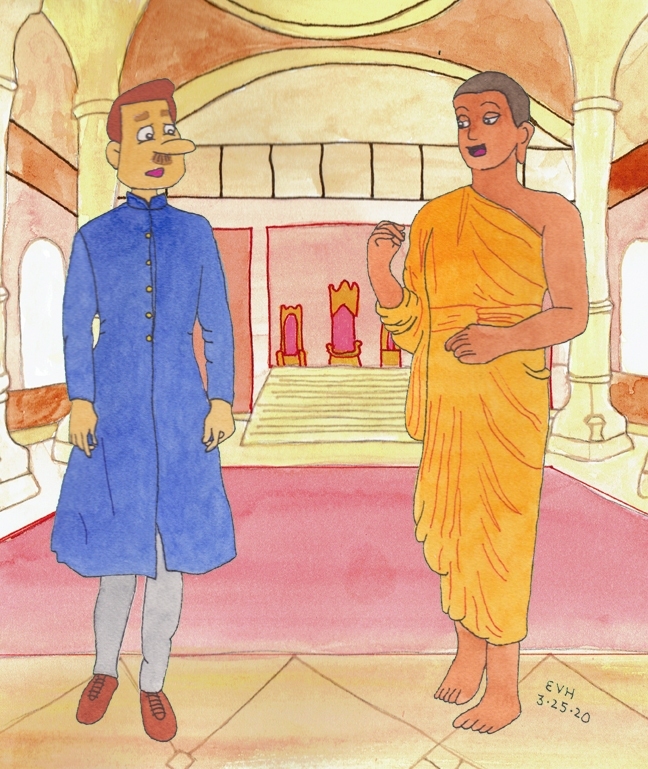
Jataka 235
Vacchanakha Jātaka
The Story of Vacchanakha
as told by Eric Van Horn
originally translated by William Henry Denham Rouse, Cambridge University
originally edited by Professor Edward Byles Cowell, Cambridge University
This story has two themes: the dangers of craving and sense desire, and the burdens of living the life of a householder, an ordinary being. The Buddha is particularly harsh in his assessment of what is required to own houses (be rich), saying that you must “lie and cheat” and “deal many a blow.” What one person has another person does not have, and everything that we consume we take from the earth. The Buddha gave a discourse on the “Fruits of the Homeless Life” in which he says:
“The household life is close and dusty, the homeless life is free as air. It is not easy, living the household life, to live the fully-perfected holy life, purified and polished like a conch-shell.” – [DN 2.40]
“Houses in the world are sweet.” The Master told this story when he was at Jetavana. It is about Roja the Mallian. (The “Mallas” lived in Kushinara where the Buddha died.)
We learn that this man, who was a lay friend of Ānanda’s, sent the Elder a message that he should come to him. The Elder took leave of the Master and went. He served the Elder with all sorts of food. Then he sat down on one side and engaged him in a pleasant conversation. Then he offered the Elder a share of his house, tempting him by the five types of sense desire. “Ānanda, sir, I have at home great store of live and dead stock. I will divide it and give you half. Let us live in one house together!” The Elder declared to him that suffering comes from desire. Then he rose from his seat and returned to the monastery.
When the Master asked whether he had seen Roja, he replied that he had. “What did he say to you?”
“Sir, Roja invited me to return to the world. Then I explained to him that suffering comes from sense desires and the worldly life.” The Master said, “Ānanda, this is not the first time that Roja the Mallian has invited bhikkhus (monks) to return to the world. He did the same before.” And then, at Ānanda’s request, he told this story from the past.
Once upon a time, when Brahmadatta was the King of Benares, the Bodhisatta was born into a family of brahmins who lived in a certain market town. When he came of age, he took up the holy life, and he lived for a long time in the Himalayas.
One day he went to Benares to purchase salt and seasoning. While he was there, he stayed in the King’s gardens. On the next day he went into Benares.
Now a certain rich man of the place, pleased at his behavior, took him home. He gave him food to eat and made him promise to live with him. He lived in the garden, and the rich man attended to his needs. And they developed a friendship for each other.
One day, the rich man, because of his love and friendship for the Bodhisatta, thought to himself, “The life of a recluse is unhappy. I will persuade my friend Vacchanakha to disrobe. I will divide my wealth in two and give half to him, and we both will live together.” So one day, when the meal was done, he spoke sweetly to his friend and said, “Good Vacchanakha, unhappy is the hermit’s life; ’tis pleasant to live in a house. Come now, let us both together take our pleasure as we will.” So saying, he uttered the first stanza:
“Houses in the world are sweet,
Full of food, and full of treasure,
There you have your fill of meat
Eating, drinking at your pleasure.”
Upon hearing this the Bodhisatta replied, “Good sir, from ignorance you have become greedy with desire. You call the householder’s life good and the life of the recluse bad. Listen now and I will tell you how bad is the householder’s life.” And he uttered the second stanza:
“He that has houses peace can never know,
He lies and cheats, he must deal many a blow
On others’ shoulders, this fault cannot cure,
Then who into a house would willing go?”
With these words the great Buddha explained the defects of a householder’s life and went into the garden again.

Figure: Explaining the Defects of a Householder’s Life
When the Master ended this discourse, he identified the birth: “Roja the Mallian was the Benares merchant, and I was Vacchanakha the recluse.”
